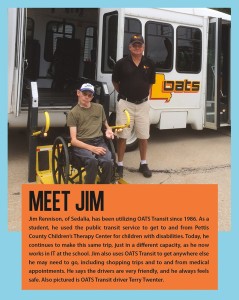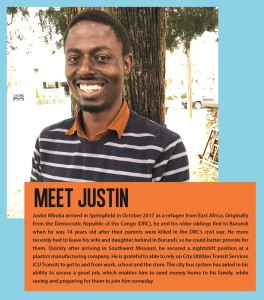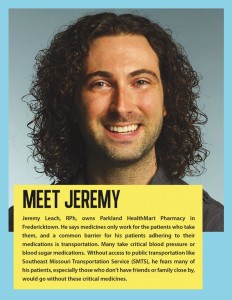Faces of MO Transit
 What Would the State of Missouri be Without Transit?
What Would the State of Missouri be Without Transit?
Without transit, many simply could not survive. There would be fewer jobs. Traveling would be more costly. Good public transit holds the community together, while providing a significant return on investment. Missouri Transit Systems impacts your neighbors, your friends, and your co-workers each and every day.
Missouri public transportation provides more than 62 million rides across the state each year. Transit is personal to Missouri, providing benefits that extend far beyond getting from point A to point B, so whether you ride transit or not, Missouri needs it.
Transit as a Sound Investment
Every dollar spent on transit has a $4 impact. That’s a 400 percent return on investment.
 Every $10 million in capital investment in public transportation yields $30 million in increased business sales, and every $1 billion invested in public transportation supports and helps create more than 50,000 jobs. The National Association of Realtors has also indicated that homes, located near public transportation with high-frequency service, are valued 42 percent higher.
Every $10 million in capital investment in public transportation yields $30 million in increased business sales, and every $1 billion invested in public transportation supports and helps create more than 50,000 jobs. The National Association of Realtors has also indicated that homes, located near public transportation with high-frequency service, are valued 42 percent higher.
Transit as an Economic Boost
Since MetroLink in St. Louis opened in 1993, there has been at least $16 billion in new development within a 10-minute walk of transit stations.
A $20 million United States Department of Transportation (USDOT) grant boosted the Kansas City streetcar project. In St. Louis, Metro received a $10.3 million federal TIGER grant for a new MetroLink Station in the Cortex Innovation Community. Cortex is a vibrant 200-acre innovation hub and technology district integrated into St.Louis’ historic Central West End and Forest Park Southeast residential neighborhoods.
And it’s not just in urban areas. A portion of the 20 percent allocated from the annual $200 million federal highway fund could be utilized for transit in rural areas.
Transit as a Cost-Savings
The average St. Louis and Kansa City household spends nearly 20 percent of its budget on transportation, which includes gas, auto lease or purchase payments, insurance and maintenance. A resident in rural Missouri or a low-income individual can spend up to 40 percent of their income on transportation.
The Need Is Growing
The St. Louis metropolitan area ranks 19th in the country in terms of population, but 68th in terms of transit coverage and access to jobs. Kansas City ranks 37th in population, but 90th in transit coverage.
OATS is the largest rural transit provider in the country serving thousands each year. Yet, Missouri ranks 45th of the 50 states in public transportation funding, and spends just twenty-five cents per capita based on 2015 funding.
Growth Depends on Transit
In order for transit to grow and prosper, the system needs to be expanded to include more riders, more neighborhoods and more rural areas. The economic prospects of metro areas are directly related to the quality of access to transportation, which makes additional major investments in public transportation essential.
 Public transit helps solve problems created by too many automobiles. These problems include traffic and parking congestion, traffic accidents, road and parking infrastructures costs, automobile costs to consumers, inadequate mobility for non-drivers, excessive energy consumption and pollution emissions.
Public transit helps solve problems created by too many automobiles. These problems include traffic and parking congestion, traffic accidents, road and parking infrastructures costs, automobile costs to consumers, inadequate mobility for non-drivers, excessive energy consumption and pollution emissions.
The Bottom Line
Leaders have done substantial planning to identify key projects that will offer more public transportation options with significant economic impact across the state. Their plans will improve access to opportunity, attract talent and create thousands of jobs.
However, the economic future of the State of Missouri is in the hands of our elected officials. Funding for public transit is critical, it is personal, and it must move forward if our region, and this state, are to expand and grow. Transit needs to be almost everywhere, for everybody, every day.
Get Involved!
Please consider getting involved by …
- Calling, emailing or visiting legislators, and the governor, to express interest in transit funding. They need to hear from their constituents that transit makes a difference.
- Liking our Facebook page or following us on Twitter to stay on top of the latest transit issues and news.
- Riding transit and encouraging others to do so.

